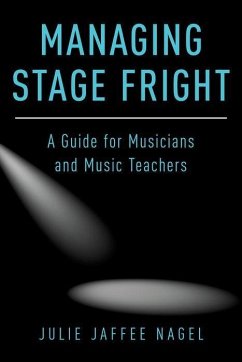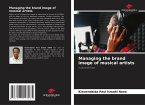Julie Jaffee Nagel, Kelly J. Murphy, Angela K. Troyer
Managing Stage Fright
A Guide for Musicians and Music Teachers
Julie Jaffee Nagel, Kelly J. Murphy, Angela K. Troyer
Managing Stage Fright
A Guide for Musicians and Music Teachers
- Broschiertes Buch
- Merkliste
- Auf die Merkliste
- Bewerten Bewerten
- Teilen
- Produkt teilen
- Produkterinnerung
- Produkterinnerung
One in ten adults over 65 has some form of mild cognitive impairment or MCI--thinking problems that go beyond those associated with normal aging, but that fall short of the serious impairments experienced by people with Alzheimer's Disease and other dementias. This is the first book written specifically for individuals with MCI, for their loved ones, and for the health care professionals who treat them. Written by three clinicians and researchers who have devoted their careers to MCI patients, this book provides up-to-date and reliable information on the nature of this disorder, how it may…mehr
Andere Kunden interessierten sich auch für
![Modern Music and Musicians for Vocalists. [Encyclopedic] Editor in Chief: Louis C. Elson. Managing Editor: Nicholas De Vore Modern Music and Musicians for Vocalists. [Encyclopedic] Editor in Chief: Louis C. Elson. Managing Editor: Nicholas De Vore]() Louis Charles ElsonModern Music and Musicians for Vocalists. [Encyclopedic] Editor in Chief: Louis C. Elson. Managing Editor: Nicholas De Vore41,99 €
Louis Charles ElsonModern Music and Musicians for Vocalists. [Encyclopedic] Editor in Chief: Louis C. Elson. Managing Editor: Nicholas De Vore41,99 €![Modern Music and Musicians for Vocalists. [Encyclopedic] Editor in Chief: Louis C. Elson. Managing Editor: Nicholas De Vore; 3 Modern Music and Musicians for Vocalists. [Encyclopedic] Editor in Chief: Louis C. Elson. Managing Editor: Nicholas De Vore; 3]() Louis Charles ElsonModern Music and Musicians for Vocalists. [Encyclopedic] Editor in Chief: Louis C. Elson. Managing Editor: Nicholas De Vore; 339,99 €
Louis Charles ElsonModern Music and Musicians for Vocalists. [Encyclopedic] Editor in Chief: Louis C. Elson. Managing Editor: Nicholas De Vore; 339,99 €![Managing the brand image of musical artists Managing the brand image of musical artists]() Kiswendsida Paul Ismaël NanaManaging the brand image of musical artists47,99 €
Kiswendsida Paul Ismaël NanaManaging the brand image of musical artists47,99 €![Teaching Music to Students with Special Needs Teaching Music to Students with Special Needs]() Alice M. HammelTeaching Music to Students with Special Needs34,99 €
Alice M. HammelTeaching Music to Students with Special Needs34,99 €![The Musician's Guide to Acoustics The Musician's Guide to Acoustics]() Murray CampbellThe Musician's Guide to Acoustics186,99 €
Murray CampbellThe Musician's Guide to Acoustics186,99 €![Roots of the Classical Roots of the Classical]() Peter Van Der MerweRoots of the Classical484,99 €
Peter Van Der MerweRoots of the Classical484,99 €![Giving Voice to Love Giving Voice to Love]() Judith A PerainoGiving Voice to Love101,99 €
Judith A PerainoGiving Voice to Love101,99 €-
-
-
One in ten adults over 65 has some form of mild cognitive impairment or MCI--thinking problems that go beyond those associated with normal aging, but that fall short of the serious impairments experienced by people with Alzheimer's Disease and other dementias. This is the first book written specifically for individuals with MCI, for their loved ones, and for the health care professionals who treat them. Written by three clinicians and researchers who have devoted their careers to MCI patients, this book provides up-to-date and reliable information on the nature of this disorder, how it may affect people, and what can be done about it. The authors explain how MCI is diagnosed and treated and they offer advice on how to improve cognitive health through diet and exercise, through social engagement, and through the use of practical, effective memory strategies. Throughout, case studies illustrate the real-life issues facing people living with MCI. The book includes "Questions to Ask Your Doctor," recommended readings and links to relevant websites, and worksheets to guide readers through healthy lifestyle changes.
Hinweis: Dieser Artikel kann nur an eine deutsche Lieferadresse ausgeliefert werden.
Hinweis: Dieser Artikel kann nur an eine deutsche Lieferadresse ausgeliefert werden.
Produktdetails
- Produktdetails
- Verlag: Oxford University Press, USA
- Seitenzahl: 234
- Erscheinungstermin: 1. August 2012
- Englisch
- Abmessung: 210mm x 140mm x 14mm
- Gewicht: 327g
- ISBN-13: 9780190632038
- ISBN-10: 0190632038
- Artikelnr.: 48064099
- Herstellerkennzeichnung
- Libri GmbH
- Europaallee 1
- 36244 Bad Hersfeld
- gpsr@libri.de
- Verlag: Oxford University Press, USA
- Seitenzahl: 234
- Erscheinungstermin: 1. August 2012
- Englisch
- Abmessung: 210mm x 140mm x 14mm
- Gewicht: 327g
- ISBN-13: 9780190632038
- ISBN-10: 0190632038
- Artikelnr.: 48064099
- Herstellerkennzeichnung
- Libri GmbH
- Europaallee 1
- 36244 Bad Hersfeld
- gpsr@libri.de
Julie Jaffee Nagel, Ph.D. is a graduate of The Juilliard School, The University of Michigan and The Michigan Psychoanalytic Institute. The critically acclaimed author of Melodies of the Mind, she has drawn from over twenty years of multidisciplinary experience to shed light on performance anxiety as well as the important role of music in understanding a wide range of human emotions. She is also a regular contributor to Huffington Post and The Clavier Companion. She is in private practice in Ann Arbor, Michigan.
* Figures
* Preface
* Acknowledgments
* CHAPTER 1 - STAGE FRIGHT: WHAT IS IT?
* Questions for Thought
* Some General Considerations About Stage Fright
* A Personal Reflection
* Music Teachers as Mental Health Resources
* Paradoxical Questions and Further Thoughts About Stage Fright
* Yerkes-Dodson Law ("Arc of Anxiety")
* Mental Preparation: Attitudes and Aptitudes
* Talking and Listening to Students: Validating Feelings
* Implications for Music Teachers
* CHAPTER 2 - DELVING DEEPER INTO STAGE FRIGHT
* Questions for Thought
* Stage Fright: A Mind/Body Duet
* Symptoms of Performance Anxiety
* Discussing Performance Anxiety In Studio Class
* Identifying Performance Anxiety Symptoms
* Symptoms Chart
* Two Activities
* 1-Mood Ring
* 2-Chill Out: Tools for "Cool" Students
* Implications for Music Teachers
* CHAPTER 3 - THE A B Cs OF STAGE FRIGHT
* Questions for Thought
* An A B C Model of Anxiety
* Recap: A B C Model
* Vignette: John
* Actions for Teachers and Students
* Activity 1-Identifying Letter B Responses
* Activity 2-Letter B Cards (Supportive Self-Statements)
* Examples of Supportive Self-Statements
* Implications for Teachers
* CHAPTER 4 - SYMPTOMS VS. MANAGEMENT
* Questions for Thought
* Symptoms as Cues and Clues
* Vignette: Cindy
* Assessing Thoughts and Feelings
* Talking About Stressors
* Implications for Teachers
* CHAPTER 5 - CONFLICT - A PARADOX
* Questions for Thought
* Paradox: Identifying Emotional Conflicts
* Recognizing Conflicts
* Dealing with Memory Slips and Technique Meltdowns
* Jam Plan
* Some Childhood Antecedents of Stage Fright
* Additional Examples of Conflict
* Vignette: Robert
* Young Children (and Adults) Fill the Gaps
* Additional Considerations About Conflict
* Conflict Chart
* Symptoms Chart
* Implications for Teachers
* CHAPTER 6 - THE EMOTIONAL FUEL BEHIND STAGE FRIGHT
* Questions for Thought
* Psychodynamic Model
* Why Consider Psychodynamic Models of the Mind?
* Mental Ghosts Haunting the Teaching Studio
* The Mind Does Not Forget: the Unconscious
* A Visual Model of the Unconscious
* Figure 1 - Conceptual Diagram of the Unconscious
* Revisiting Cindy
* Transference
* Shame
* Countertransference
* Multiple Function
* Vignette: Joe
* Psychological and Practical Tips
* Imagine This.....
* Implications for Teachers
* CHAPTER 7 - DEFENDING AGAINST ANXIETY
* Questions for Thought
* Performance as a Danger Situation: Ego Defenses
* The Ego and Its Defenses Against Anxiety
* Table 1 - Typical Ego Defenses
* Vignette: Mary
* Table 2:Performance Anxiety Symptoms as Ego Defenses
* (Letter B)
* A B C Model of Anxiety
* Activity 1 - Recognizing Anxiety
* Activity 2 - Relabeling Anxiety
* Vignette: Cindy's Cold Hands as Ego Defenses
* Shame Masquerading as Resistance to Performance Anxiety
* Shame on You!
* A Fusion of Musical and Personal Identity
* Helping Students Discover Their Ego Defenses
* Implications for Teachers
* CHAPTER 8 - LEARNING THEORY AND BEHAVIOR MODIFICATION
* Questions for Thought
* Learning Theories as Guidelines for Teachers
* Classical Conditioning
* Operant Conditioning
* Implications for Teachers
* CHAPTER 9 - COGNITIVE BEHVIOR THERAPY, RATIONAL EMOTIVE THERAPY, AND
LETTER B
* Questions for Teachers
* What Is Cognitive Behavior Therapy (CBT)?
* An Example of Cognitive Relabeling Stage Fright Responses
* Two Activities With A B C Model
* Activity 1 - A B C Recognizing Anxiety Responses
* Activity 2 - Rethinking and Relabeling Anxiety Responses
* Neuropsychology and Brain Imagining
* Beta Blockers and Performance Anxiety
* Evidence-Based Claims for Reducing Performance Anxiety
* Implications for Teachers
* CHAPTER 10 - PERFORMANCE ANXIETY BEGINS IN THE NURSERY
* Questions for Thought
* Teachers As "New Parents": Developmental Issues
* Human Development and Performance Anxiety
* Elaboration of Erikson's Eight Stages in the Life Cycle
* Stage One: Trust vs. Mistrust
* Implications for Teachers
* Stage Two: Autonomy vs. Shame and Doubt
* Implications for Teachers
* Stage Three: Initiative vs. Guilt and
* Stage Four: Industry vs. Inferiority
* Anxiety Alerts for Teachers!!!!!
* Young Children
* Middle School-Aged Children
* Implications for Teachers
* Stage Five: Identity vs. Identity Confusion
* Anxiety Alerts for Teachers!!!!
* Adolescents
* Implications for Teachers
* Stage Six: Intimacy vs. Isolation
* Implications for Teachers
* Stage Seven: Generativity vs. Stagnation
* Implications for Teachers
* Stage Eight: Integrity vs. Despair
* Implications for Teachers
* Recap: Developmental Stages and Stage Fright
* Additional Implications for Teachers
* CHAPTER 11 - A "VIRTUAL" RECITAL: A SYNTHESIS
* Questions for Thought
* Susan: How to Understand and Handle Performance Anxiety
* Concepts for the Teacher to Convey to Susan, The Recitalist
* Plan for Teacher
* Format of "Virtual" Recital
* The Recital
* Implications for Teacher and Recitalist
* CHAPTER 12 - RECAPITULATION AND FINALE
* Questions for Thought
* Putting it All Together
* Performance Anxiety is More Than Symptoms
* Stigmas, Caution, and Optimism
* Tuning In To Students and Tune Ups for Teachers
* Interdisciplinary Collaboration
* Criteria for Making A Referral for Professional Help
* Music School Curriculum
* Coda: Summary of Implications for Recognizing and Teaching Anxiety
Reduction
* Uniqueness of Music Teacher's Role
* CHAPTER 13 - DA CAPO: BACK TO THE BEGINNING
* GLOSSARY OF PSYCHOLOGICAL TERMS USED IN THE TEXT
* ILLUSTRATIVE READINGS ON PERFORMANCE ANXIETY
* INDEX
* Preface
* Acknowledgments
* CHAPTER 1 - STAGE FRIGHT: WHAT IS IT?
* Questions for Thought
* Some General Considerations About Stage Fright
* A Personal Reflection
* Music Teachers as Mental Health Resources
* Paradoxical Questions and Further Thoughts About Stage Fright
* Yerkes-Dodson Law ("Arc of Anxiety")
* Mental Preparation: Attitudes and Aptitudes
* Talking and Listening to Students: Validating Feelings
* Implications for Music Teachers
* CHAPTER 2 - DELVING DEEPER INTO STAGE FRIGHT
* Questions for Thought
* Stage Fright: A Mind/Body Duet
* Symptoms of Performance Anxiety
* Discussing Performance Anxiety In Studio Class
* Identifying Performance Anxiety Symptoms
* Symptoms Chart
* Two Activities
* 1-Mood Ring
* 2-Chill Out: Tools for "Cool" Students
* Implications for Music Teachers
* CHAPTER 3 - THE A B Cs OF STAGE FRIGHT
* Questions for Thought
* An A B C Model of Anxiety
* Recap: A B C Model
* Vignette: John
* Actions for Teachers and Students
* Activity 1-Identifying Letter B Responses
* Activity 2-Letter B Cards (Supportive Self-Statements)
* Examples of Supportive Self-Statements
* Implications for Teachers
* CHAPTER 4 - SYMPTOMS VS. MANAGEMENT
* Questions for Thought
* Symptoms as Cues and Clues
* Vignette: Cindy
* Assessing Thoughts and Feelings
* Talking About Stressors
* Implications for Teachers
* CHAPTER 5 - CONFLICT - A PARADOX
* Questions for Thought
* Paradox: Identifying Emotional Conflicts
* Recognizing Conflicts
* Dealing with Memory Slips and Technique Meltdowns
* Jam Plan
* Some Childhood Antecedents of Stage Fright
* Additional Examples of Conflict
* Vignette: Robert
* Young Children (and Adults) Fill the Gaps
* Additional Considerations About Conflict
* Conflict Chart
* Symptoms Chart
* Implications for Teachers
* CHAPTER 6 - THE EMOTIONAL FUEL BEHIND STAGE FRIGHT
* Questions for Thought
* Psychodynamic Model
* Why Consider Psychodynamic Models of the Mind?
* Mental Ghosts Haunting the Teaching Studio
* The Mind Does Not Forget: the Unconscious
* A Visual Model of the Unconscious
* Figure 1 - Conceptual Diagram of the Unconscious
* Revisiting Cindy
* Transference
* Shame
* Countertransference
* Multiple Function
* Vignette: Joe
* Psychological and Practical Tips
* Imagine This.....
* Implications for Teachers
* CHAPTER 7 - DEFENDING AGAINST ANXIETY
* Questions for Thought
* Performance as a Danger Situation: Ego Defenses
* The Ego and Its Defenses Against Anxiety
* Table 1 - Typical Ego Defenses
* Vignette: Mary
* Table 2:Performance Anxiety Symptoms as Ego Defenses
* (Letter B)
* A B C Model of Anxiety
* Activity 1 - Recognizing Anxiety
* Activity 2 - Relabeling Anxiety
* Vignette: Cindy's Cold Hands as Ego Defenses
* Shame Masquerading as Resistance to Performance Anxiety
* Shame on You!
* A Fusion of Musical and Personal Identity
* Helping Students Discover Their Ego Defenses
* Implications for Teachers
* CHAPTER 8 - LEARNING THEORY AND BEHAVIOR MODIFICATION
* Questions for Thought
* Learning Theories as Guidelines for Teachers
* Classical Conditioning
* Operant Conditioning
* Implications for Teachers
* CHAPTER 9 - COGNITIVE BEHVIOR THERAPY, RATIONAL EMOTIVE THERAPY, AND
LETTER B
* Questions for Teachers
* What Is Cognitive Behavior Therapy (CBT)?
* An Example of Cognitive Relabeling Stage Fright Responses
* Two Activities With A B C Model
* Activity 1 - A B C Recognizing Anxiety Responses
* Activity 2 - Rethinking and Relabeling Anxiety Responses
* Neuropsychology and Brain Imagining
* Beta Blockers and Performance Anxiety
* Evidence-Based Claims for Reducing Performance Anxiety
* Implications for Teachers
* CHAPTER 10 - PERFORMANCE ANXIETY BEGINS IN THE NURSERY
* Questions for Thought
* Teachers As "New Parents": Developmental Issues
* Human Development and Performance Anxiety
* Elaboration of Erikson's Eight Stages in the Life Cycle
* Stage One: Trust vs. Mistrust
* Implications for Teachers
* Stage Two: Autonomy vs. Shame and Doubt
* Implications for Teachers
* Stage Three: Initiative vs. Guilt and
* Stage Four: Industry vs. Inferiority
* Anxiety Alerts for Teachers!!!!!
* Young Children
* Middle School-Aged Children
* Implications for Teachers
* Stage Five: Identity vs. Identity Confusion
* Anxiety Alerts for Teachers!!!!
* Adolescents
* Implications for Teachers
* Stage Six: Intimacy vs. Isolation
* Implications for Teachers
* Stage Seven: Generativity vs. Stagnation
* Implications for Teachers
* Stage Eight: Integrity vs. Despair
* Implications for Teachers
* Recap: Developmental Stages and Stage Fright
* Additional Implications for Teachers
* CHAPTER 11 - A "VIRTUAL" RECITAL: A SYNTHESIS
* Questions for Thought
* Susan: How to Understand and Handle Performance Anxiety
* Concepts for the Teacher to Convey to Susan, The Recitalist
* Plan for Teacher
* Format of "Virtual" Recital
* The Recital
* Implications for Teacher and Recitalist
* CHAPTER 12 - RECAPITULATION AND FINALE
* Questions for Thought
* Putting it All Together
* Performance Anxiety is More Than Symptoms
* Stigmas, Caution, and Optimism
* Tuning In To Students and Tune Ups for Teachers
* Interdisciplinary Collaboration
* Criteria for Making A Referral for Professional Help
* Music School Curriculum
* Coda: Summary of Implications for Recognizing and Teaching Anxiety
Reduction
* Uniqueness of Music Teacher's Role
* CHAPTER 13 - DA CAPO: BACK TO THE BEGINNING
* GLOSSARY OF PSYCHOLOGICAL TERMS USED IN THE TEXT
* ILLUSTRATIVE READINGS ON PERFORMANCE ANXIETY
* INDEX
* Figures
* Preface
* Acknowledgments
* CHAPTER 1 - STAGE FRIGHT: WHAT IS IT?
* Questions for Thought
* Some General Considerations About Stage Fright
* A Personal Reflection
* Music Teachers as Mental Health Resources
* Paradoxical Questions and Further Thoughts About Stage Fright
* Yerkes-Dodson Law ("Arc of Anxiety")
* Mental Preparation: Attitudes and Aptitudes
* Talking and Listening to Students: Validating Feelings
* Implications for Music Teachers
* CHAPTER 2 - DELVING DEEPER INTO STAGE FRIGHT
* Questions for Thought
* Stage Fright: A Mind/Body Duet
* Symptoms of Performance Anxiety
* Discussing Performance Anxiety In Studio Class
* Identifying Performance Anxiety Symptoms
* Symptoms Chart
* Two Activities
* 1-Mood Ring
* 2-Chill Out: Tools for "Cool" Students
* Implications for Music Teachers
* CHAPTER 3 - THE A B Cs OF STAGE FRIGHT
* Questions for Thought
* An A B C Model of Anxiety
* Recap: A B C Model
* Vignette: John
* Actions for Teachers and Students
* Activity 1-Identifying Letter B Responses
* Activity 2-Letter B Cards (Supportive Self-Statements)
* Examples of Supportive Self-Statements
* Implications for Teachers
* CHAPTER 4 - SYMPTOMS VS. MANAGEMENT
* Questions for Thought
* Symptoms as Cues and Clues
* Vignette: Cindy
* Assessing Thoughts and Feelings
* Talking About Stressors
* Implications for Teachers
* CHAPTER 5 - CONFLICT - A PARADOX
* Questions for Thought
* Paradox: Identifying Emotional Conflicts
* Recognizing Conflicts
* Dealing with Memory Slips and Technique Meltdowns
* Jam Plan
* Some Childhood Antecedents of Stage Fright
* Additional Examples of Conflict
* Vignette: Robert
* Young Children (and Adults) Fill the Gaps
* Additional Considerations About Conflict
* Conflict Chart
* Symptoms Chart
* Implications for Teachers
* CHAPTER 6 - THE EMOTIONAL FUEL BEHIND STAGE FRIGHT
* Questions for Thought
* Psychodynamic Model
* Why Consider Psychodynamic Models of the Mind?
* Mental Ghosts Haunting the Teaching Studio
* The Mind Does Not Forget: the Unconscious
* A Visual Model of the Unconscious
* Figure 1 - Conceptual Diagram of the Unconscious
* Revisiting Cindy
* Transference
* Shame
* Countertransference
* Multiple Function
* Vignette: Joe
* Psychological and Practical Tips
* Imagine This.....
* Implications for Teachers
* CHAPTER 7 - DEFENDING AGAINST ANXIETY
* Questions for Thought
* Performance as a Danger Situation: Ego Defenses
* The Ego and Its Defenses Against Anxiety
* Table 1 - Typical Ego Defenses
* Vignette: Mary
* Table 2:Performance Anxiety Symptoms as Ego Defenses
* (Letter B)
* A B C Model of Anxiety
* Activity 1 - Recognizing Anxiety
* Activity 2 - Relabeling Anxiety
* Vignette: Cindy's Cold Hands as Ego Defenses
* Shame Masquerading as Resistance to Performance Anxiety
* Shame on You!
* A Fusion of Musical and Personal Identity
* Helping Students Discover Their Ego Defenses
* Implications for Teachers
* CHAPTER 8 - LEARNING THEORY AND BEHAVIOR MODIFICATION
* Questions for Thought
* Learning Theories as Guidelines for Teachers
* Classical Conditioning
* Operant Conditioning
* Implications for Teachers
* CHAPTER 9 - COGNITIVE BEHVIOR THERAPY, RATIONAL EMOTIVE THERAPY, AND
LETTER B
* Questions for Teachers
* What Is Cognitive Behavior Therapy (CBT)?
* An Example of Cognitive Relabeling Stage Fright Responses
* Two Activities With A B C Model
* Activity 1 - A B C Recognizing Anxiety Responses
* Activity 2 - Rethinking and Relabeling Anxiety Responses
* Neuropsychology and Brain Imagining
* Beta Blockers and Performance Anxiety
* Evidence-Based Claims for Reducing Performance Anxiety
* Implications for Teachers
* CHAPTER 10 - PERFORMANCE ANXIETY BEGINS IN THE NURSERY
* Questions for Thought
* Teachers As "New Parents": Developmental Issues
* Human Development and Performance Anxiety
* Elaboration of Erikson's Eight Stages in the Life Cycle
* Stage One: Trust vs. Mistrust
* Implications for Teachers
* Stage Two: Autonomy vs. Shame and Doubt
* Implications for Teachers
* Stage Three: Initiative vs. Guilt and
* Stage Four: Industry vs. Inferiority
* Anxiety Alerts for Teachers!!!!!
* Young Children
* Middle School-Aged Children
* Implications for Teachers
* Stage Five: Identity vs. Identity Confusion
* Anxiety Alerts for Teachers!!!!
* Adolescents
* Implications for Teachers
* Stage Six: Intimacy vs. Isolation
* Implications for Teachers
* Stage Seven: Generativity vs. Stagnation
* Implications for Teachers
* Stage Eight: Integrity vs. Despair
* Implications for Teachers
* Recap: Developmental Stages and Stage Fright
* Additional Implications for Teachers
* CHAPTER 11 - A "VIRTUAL" RECITAL: A SYNTHESIS
* Questions for Thought
* Susan: How to Understand and Handle Performance Anxiety
* Concepts for the Teacher to Convey to Susan, The Recitalist
* Plan for Teacher
* Format of "Virtual" Recital
* The Recital
* Implications for Teacher and Recitalist
* CHAPTER 12 - RECAPITULATION AND FINALE
* Questions for Thought
* Putting it All Together
* Performance Anxiety is More Than Symptoms
* Stigmas, Caution, and Optimism
* Tuning In To Students and Tune Ups for Teachers
* Interdisciplinary Collaboration
* Criteria for Making A Referral for Professional Help
* Music School Curriculum
* Coda: Summary of Implications for Recognizing and Teaching Anxiety
Reduction
* Uniqueness of Music Teacher's Role
* CHAPTER 13 - DA CAPO: BACK TO THE BEGINNING
* GLOSSARY OF PSYCHOLOGICAL TERMS USED IN THE TEXT
* ILLUSTRATIVE READINGS ON PERFORMANCE ANXIETY
* INDEX
* Preface
* Acknowledgments
* CHAPTER 1 - STAGE FRIGHT: WHAT IS IT?
* Questions for Thought
* Some General Considerations About Stage Fright
* A Personal Reflection
* Music Teachers as Mental Health Resources
* Paradoxical Questions and Further Thoughts About Stage Fright
* Yerkes-Dodson Law ("Arc of Anxiety")
* Mental Preparation: Attitudes and Aptitudes
* Talking and Listening to Students: Validating Feelings
* Implications for Music Teachers
* CHAPTER 2 - DELVING DEEPER INTO STAGE FRIGHT
* Questions for Thought
* Stage Fright: A Mind/Body Duet
* Symptoms of Performance Anxiety
* Discussing Performance Anxiety In Studio Class
* Identifying Performance Anxiety Symptoms
* Symptoms Chart
* Two Activities
* 1-Mood Ring
* 2-Chill Out: Tools for "Cool" Students
* Implications for Music Teachers
* CHAPTER 3 - THE A B Cs OF STAGE FRIGHT
* Questions for Thought
* An A B C Model of Anxiety
* Recap: A B C Model
* Vignette: John
* Actions for Teachers and Students
* Activity 1-Identifying Letter B Responses
* Activity 2-Letter B Cards (Supportive Self-Statements)
* Examples of Supportive Self-Statements
* Implications for Teachers
* CHAPTER 4 - SYMPTOMS VS. MANAGEMENT
* Questions for Thought
* Symptoms as Cues and Clues
* Vignette: Cindy
* Assessing Thoughts and Feelings
* Talking About Stressors
* Implications for Teachers
* CHAPTER 5 - CONFLICT - A PARADOX
* Questions for Thought
* Paradox: Identifying Emotional Conflicts
* Recognizing Conflicts
* Dealing with Memory Slips and Technique Meltdowns
* Jam Plan
* Some Childhood Antecedents of Stage Fright
* Additional Examples of Conflict
* Vignette: Robert
* Young Children (and Adults) Fill the Gaps
* Additional Considerations About Conflict
* Conflict Chart
* Symptoms Chart
* Implications for Teachers
* CHAPTER 6 - THE EMOTIONAL FUEL BEHIND STAGE FRIGHT
* Questions for Thought
* Psychodynamic Model
* Why Consider Psychodynamic Models of the Mind?
* Mental Ghosts Haunting the Teaching Studio
* The Mind Does Not Forget: the Unconscious
* A Visual Model of the Unconscious
* Figure 1 - Conceptual Diagram of the Unconscious
* Revisiting Cindy
* Transference
* Shame
* Countertransference
* Multiple Function
* Vignette: Joe
* Psychological and Practical Tips
* Imagine This.....
* Implications for Teachers
* CHAPTER 7 - DEFENDING AGAINST ANXIETY
* Questions for Thought
* Performance as a Danger Situation: Ego Defenses
* The Ego and Its Defenses Against Anxiety
* Table 1 - Typical Ego Defenses
* Vignette: Mary
* Table 2:Performance Anxiety Symptoms as Ego Defenses
* (Letter B)
* A B C Model of Anxiety
* Activity 1 - Recognizing Anxiety
* Activity 2 - Relabeling Anxiety
* Vignette: Cindy's Cold Hands as Ego Defenses
* Shame Masquerading as Resistance to Performance Anxiety
* Shame on You!
* A Fusion of Musical and Personal Identity
* Helping Students Discover Their Ego Defenses
* Implications for Teachers
* CHAPTER 8 - LEARNING THEORY AND BEHAVIOR MODIFICATION
* Questions for Thought
* Learning Theories as Guidelines for Teachers
* Classical Conditioning
* Operant Conditioning
* Implications for Teachers
* CHAPTER 9 - COGNITIVE BEHVIOR THERAPY, RATIONAL EMOTIVE THERAPY, AND
LETTER B
* Questions for Teachers
* What Is Cognitive Behavior Therapy (CBT)?
* An Example of Cognitive Relabeling Stage Fright Responses
* Two Activities With A B C Model
* Activity 1 - A B C Recognizing Anxiety Responses
* Activity 2 - Rethinking and Relabeling Anxiety Responses
* Neuropsychology and Brain Imagining
* Beta Blockers and Performance Anxiety
* Evidence-Based Claims for Reducing Performance Anxiety
* Implications for Teachers
* CHAPTER 10 - PERFORMANCE ANXIETY BEGINS IN THE NURSERY
* Questions for Thought
* Teachers As "New Parents": Developmental Issues
* Human Development and Performance Anxiety
* Elaboration of Erikson's Eight Stages in the Life Cycle
* Stage One: Trust vs. Mistrust
* Implications for Teachers
* Stage Two: Autonomy vs. Shame and Doubt
* Implications for Teachers
* Stage Three: Initiative vs. Guilt and
* Stage Four: Industry vs. Inferiority
* Anxiety Alerts for Teachers!!!!!
* Young Children
* Middle School-Aged Children
* Implications for Teachers
* Stage Five: Identity vs. Identity Confusion
* Anxiety Alerts for Teachers!!!!
* Adolescents
* Implications for Teachers
* Stage Six: Intimacy vs. Isolation
* Implications for Teachers
* Stage Seven: Generativity vs. Stagnation
* Implications for Teachers
* Stage Eight: Integrity vs. Despair
* Implications for Teachers
* Recap: Developmental Stages and Stage Fright
* Additional Implications for Teachers
* CHAPTER 11 - A "VIRTUAL" RECITAL: A SYNTHESIS
* Questions for Thought
* Susan: How to Understand and Handle Performance Anxiety
* Concepts for the Teacher to Convey to Susan, The Recitalist
* Plan for Teacher
* Format of "Virtual" Recital
* The Recital
* Implications for Teacher and Recitalist
* CHAPTER 12 - RECAPITULATION AND FINALE
* Questions for Thought
* Putting it All Together
* Performance Anxiety is More Than Symptoms
* Stigmas, Caution, and Optimism
* Tuning In To Students and Tune Ups for Teachers
* Interdisciplinary Collaboration
* Criteria for Making A Referral for Professional Help
* Music School Curriculum
* Coda: Summary of Implications for Recognizing and Teaching Anxiety
Reduction
* Uniqueness of Music Teacher's Role
* CHAPTER 13 - DA CAPO: BACK TO THE BEGINNING
* GLOSSARY OF PSYCHOLOGICAL TERMS USED IN THE TEXT
* ILLUSTRATIVE READINGS ON PERFORMANCE ANXIETY
* INDEX


![Modern Music and Musicians for Vocalists. [Encyclopedic] Editor in Chief: Louis C. Elson. Managing Editor: Nicholas De Vore Modern Music and Musicians for Vocalists. [Encyclopedic] Editor in Chief: Louis C. Elson. Managing Editor: Nicholas De Vore](https://bilder.buecher.de/produkte/65/65538/65538798m.jpg)
![Modern Music and Musicians for Vocalists. [Encyclopedic] Editor in Chief: Louis C. Elson. Managing Editor: Nicholas De Vore; 3 Modern Music and Musicians for Vocalists. [Encyclopedic] Editor in Chief: Louis C. Elson. Managing Editor: Nicholas De Vore; 3](https://bilder.buecher.de/produkte/65/65640/65640374m.jpg)




